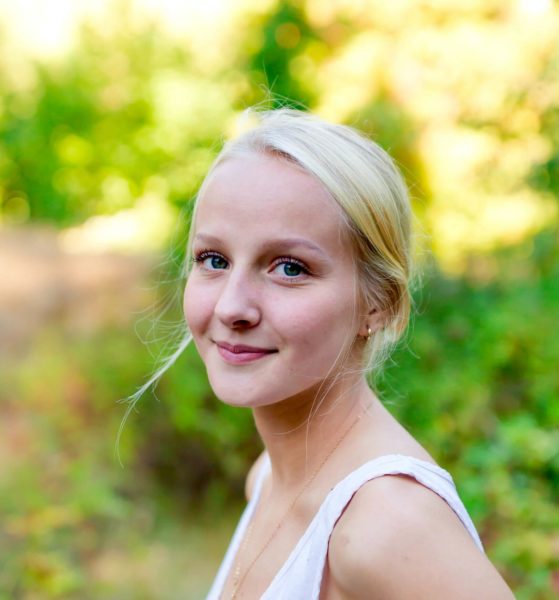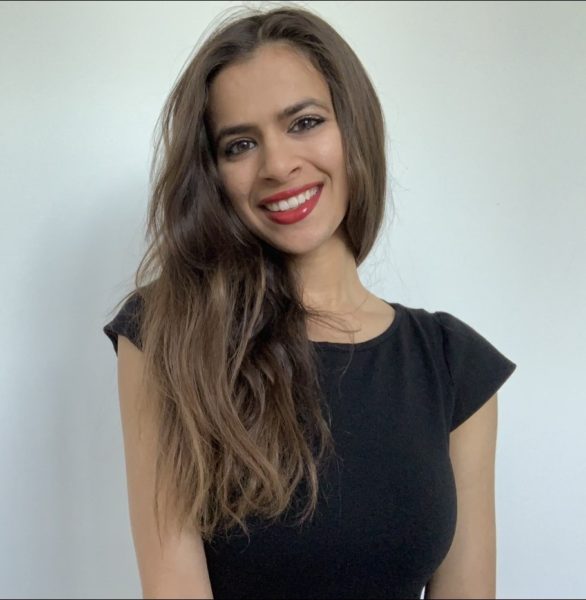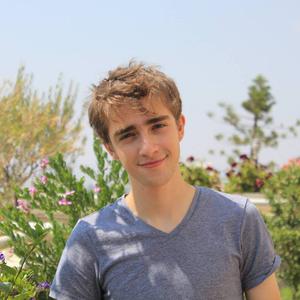Gavenas, J., Schurger, A., & Maoz, U. (2025). Probing for intentions: The early readiness potential does not reflect awareness of motor preparation. Imaging Neuroscience 2025; 3 imag_a_00465. https://doi.org/10.1162/imag_a_00465

Publications
Works from Amir Raz
Berardi, V., Lan, T., Guirguis, A., & Maoz, U. (2025). Empirically validating a computational model of automatic behavior shaping. PloS one, 20(1), e0313925. https://doi.org/10.1371/journal.pone.0313925
Buccella A, Maoz U, Mudrik L. Towards an interdisciplinary “science of the mind”: A call for enhanced collaboration between philosophy and neuroscience. Eur J Neurosci. 2024 Sep;60(5):4771-4784. https://doi.org/10.1111/ejn.16451
Gavenas, J., Rutishauser, U., Schurger, A., & Maoz, U. (2024). Slow ramping emerges from spontaneous fluctuations in spiking neural networks. Nature Communications, 15(1), 7285. https://doi.org/10.1038/s41467-024-51401-x
Dominik, T., Mele, A., Schurger, A., & Maoz, U. (2023). Libet’s legacy: A primer to the neuroscience of volition. Neuroscience & Biobehavioral Reviews, 105503. https://doi.org/10.1016/j.neubiorev.2023.105503
Mudrik, L., Mylopoulos, M., Negro, N., & Schurger, A. (2023). Theories of consciousness and a life worth living. Current Opinion in Behavioral Sciences, 53, 101299. https://doi.org/10.1016/j.cobeha.2023.101299
Papini, S., López-Castro, T., Swarbrick, M., Paul, L. K., Stanley, D., Bauer, A., … & Hien, D. A. (2023). Alcohol, cannabis, and nicotine use have distinct associations with COVID-19 pandemic-related experiences: An exploratory Bayesian network analysis across two timepoints. Drug and alcohol dependence, 109929. https://doi.org/10.1016/j.drugalcdep.2023.109929
Triggiani, A.I., Kreiman, G., Lewis, C., Maoz, U., Mele, A., Mudrik, L., Roskies, A.L., Schurger, A., Hallett, M. (2023) What is the Intention to Move and When Does it Occur? Neuroscience & Biobehavioral Reviews. https://doi.org/10.1016/j.neubiorev.2023.105199
We are honored to host Dr. Stuart Hameroff at the Brain Institute on March 2nd, 2023.
Dr. Hameroff gave a talk titled “Is the brain a computer, or a quantum orchestra? A new paradigm needed in neuroscience “.
Abstract:
Neuroscience views the brain as a complex computer of simple neurons, a paradigm unable to account for consciousness, memory nor free will, and an insult to neurons.
Single-cell organisms with no synapses perform purposeful intelligent functions using their cytoskeletal microtubules. Brain neurons are filled with microtubules, selfassembling cylindrical protein polymers which organize synapses, encode memory and process information. Microtubules collectively resonate in scale-invariant, fractal-like patterns in hertz, kilohertz, megahertz, gigahertz and terahertz frequency ranges. At the higher frequencies, quantum vibrations and state reductions can entangle and interfere across frequencies, like musical notes and chords resonating across scales. Quantum coherence provides cognitive binding, real-time causal action (by Penrose OR state reduction, enabling free will through retroactivity), and can potentially solve the ‘hard problem’. In Penrose OR, basic ‘qualia’ of conscious experience are events in the fundamental makeup of the universe, spacetime geometry. Penrose-Hameroff ‘Orch OR’ suggests microtubules in brain neurons ‘orchestrate’ qualia into full rich conscious experience. Evidence shows quantum processes in microtubules are inhibited by anesthetics which selectively block consciousness. And megahertz and gigahertz coherent oscillations can now be detected from the scalp within the EEG (Anirban Bandyopadhyay group). Neuroscience needs a new paradigm. The brain should be viewed as a scale-invariant hierarchy extending from neurons both upward to larger networks, but also downward, inward, to deeper, faster ‘scale-invariant’ quantum processes in cytoskeletal microtubules inside neurons, and ultimately to fundamental spacetime geometry. Rather than a classical computer, the brain is like a quantum orchestra. Rather than computation, consciousness is like music in the fine scale geometry of the universe.
Reference: https://www.frontiersin.org/articles/10.3389/fnmol.2022.869935/full
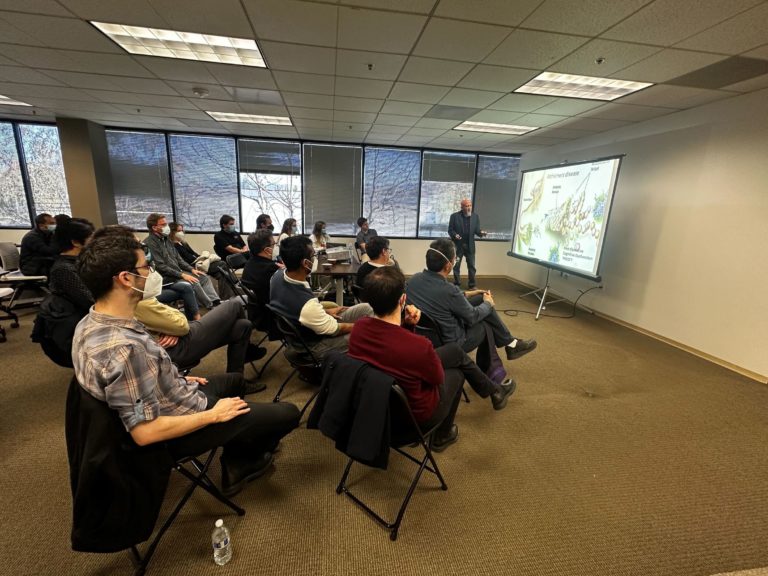
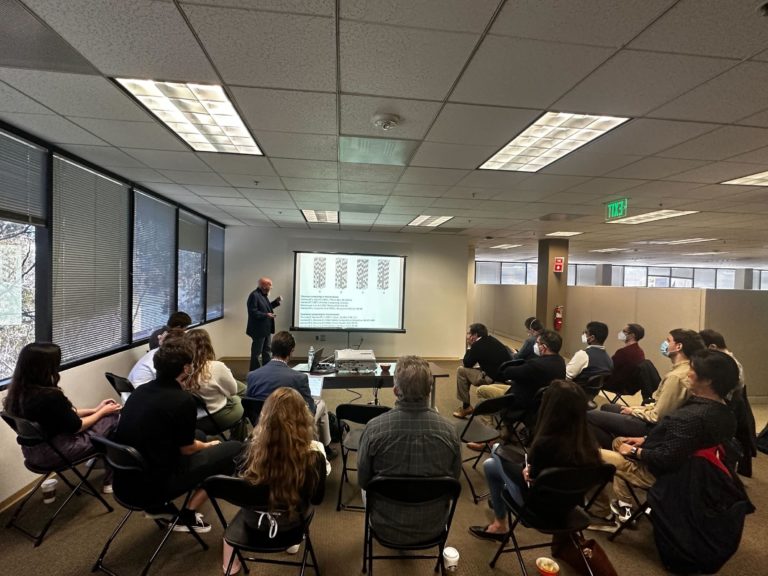
Rusch, T., Han, Y., Liang, D., Hopkins, A. R., Lawrence, C. V., Maoz, U., … & COVID-Dynamic Team. (2023). COVID-Dynamic: A large-scale longitudinal study of socioemotional and behavioral change across the pandemic. Scientific Data, 10(1), 71. https://doi.org/10.1038/s41597-022-01901-6
Congratulations to Alice and Andy on their successful PhD defense!
On November 17th, 2022, Sook Mun (Alice) Wong and Dehua (Andy) Liang passed their PhD defenses.
The title of Alice’s dissertation is “Probing the Boundaries of Human Agency“, with Drs. Uri Maoz, Aaron Schurger and Liad Mudrik on the committee.
The title of Andy’s dissertation is “Causal Inference in Psychology and Neuroscience From Association to Causation“, with Drs. Uri Maoz, Aaron Schurger and Frederick Eberhardt on the committee.
Congratulations to both of them on this important milestone!
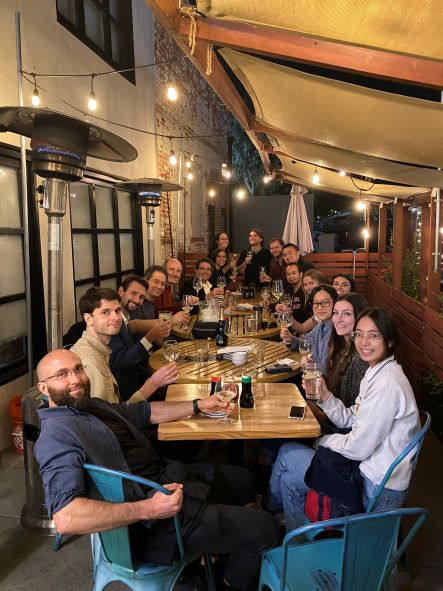
Gavenas, J., Hieronymi, P., & Maoz, U. (2022). Diverging lay intuitions about concepts related to free will in arbitrary and deliberate decisions. Consciousness and Cognition, 106, 103434. https://doi.org/10.1016/j.concog.2022.103434
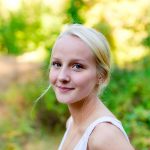
Nina Wolf
Quick Navigation

Damini Trehan
PhD Student
Quick Navigation
Herzog, M. H., Schurger, A., & Doerig, A. (2022). First-person experience cannot rescue causal structure theories from the unfolding argument. Consciousness and Cognition, 98, 103261. https://doi.org/10.1016/j.concog.2021.103261
Jillian Nooney
Quick Navigation
Jillian Nooney

Jillian graduated from Towson University in May 2022, where she earned a B.S in Psychology and Interdisciplinary Studies with a Concentration in Animal Behavior. She hopes to earn a PhD in Neuroscience and focus on consciousness research. She is interested in using a multidisciplinary approach to study consciousness, and related topics, which she plans to pursue as a postbac research assistant at the Brain Institute.
Paulius Rimkevičius
Postdoc
Quick Navigation
Paulius Rimkevičius
Postdoc

My research focuses on consciousness and free will. I am interested in whether we are conscious of what goes on in our own minds and whether we have free will. I am also interested in our beliefs about consciousness and free will and how these beliefs affect our behavior. My main current project investigates what goes on in our brains and what we are conscious of when we perform a spontaneous voluntary action, specifically: whether we are conscious of mental imagery related to the action and whether the generation of such mental imagery is reflected in a brain signal, the readiness potential, that is associated with spontaneous voluntary actions.
Melissa Brillhart
Quick Navigation
Melissa Brillhart

Melissa Brillhart recently graduated from Chapman University with degrees in Psychology and Vocal Performance. She started as a research assistant at the Brain Institute in 2021 and is continuing to pursue her research interests as a postbac research assistant.
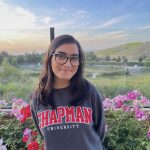
Raniyah Chishti
Quick Navigation
Raniyah Chishti
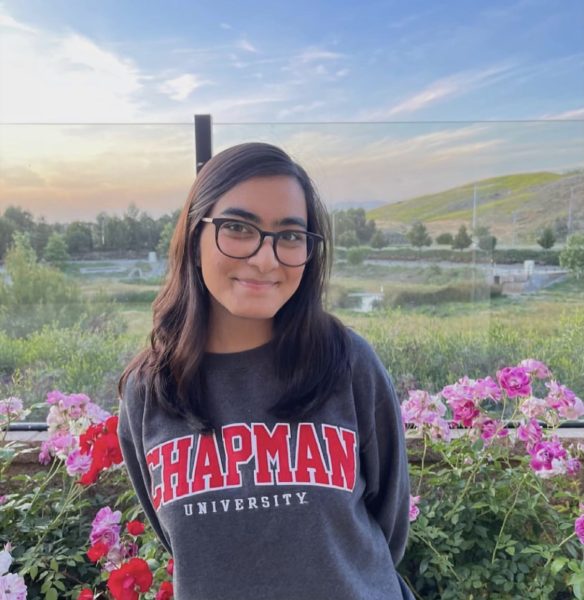
I’m an Applied Human Physiology major and an Interdisciplinary Honors minor, planning to graduate in spring of 2025. I’ve been a research assistant with the Brain Institute since spring of 2022. My research interests involve EEG, TMS, and eye-tracking.
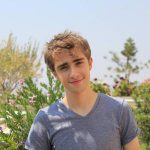
Ilai Gavish
Quick Navigation
Guillaume Pech
PhD Student (joint with Axel Cleeremans)
Quick Navigation
Guillaume Pech
PhD Student (joint with Axel Cleeremans)

I graduated from the master in cognitive sciences at the University of Lyon Lumière 2 (France) in 2021. Then, I had the opportunity to work as a research assistant during 8 months at the Université Libre de Bruxelles with Prof. Emilie CASPAR (M&SB lab). We conducted projects investigating several processes related to decision-making, such as the sense of agency, empathy for pain and cognitive conflict using EEG. We approached rare populations such as inmates, military, and former perpetrators and survivors of the genocide in Rwanda. In 2022, I had the honor to receive a 6-month predoctoral fellowship offered by the Neurophilosophy of Free Will for the project ‘Does the Readiness Potential reflect action initiation or uncertainty?’.
I am now a PhD student under the supervision of Pr. Axel CLEEREMANS (CO3) and Pr. Uri MAOZ (Brain Institute). My research focuses on the neural markers of volition, with a specific interest in the Readiness Potential. In a broader sense, my topic of interest is to investigate how to model decision-making and how these findings can feed the debate on free-will.

Tara Gruenewald
Interim Administrative Director
Quick Navigation
Tara Gruenewald
Interim Administrative Director
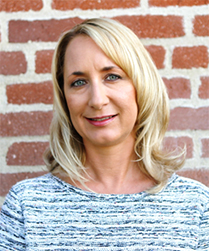
Tara Gruenewald is an Associate Professor and Chair of Psychology who joined the Chapman faculty in the Fall of 2017. She is a social and health psychologist with additional specialization in lifespan development, aging, and public health. Her research explores social risk (e.g., social stressors, social adversity, low socioeconomic status) and resilience (e.g., social support, social engagement, social connection) factors that shape mental well-being, cognitive and physical functioning and health, physiological health, and morbidity and mortality. Of particular interest are the cognitive, affective, and biological pathways through which these social risk and resilience factors are linked to health and well-being outcomes. Her work utilizes multiple methods in advancing our theoretical and empirical understanding of these associations including longitudinal cohort studies, daily experience sampling techniques, naturalistic and lab-based experiments, surveys, and randomized controlled trials.
In addition to her science, she is passionate about opportunities for leadership and service which promote health psychology, psychosomatic medicine, and biopsychosocial approaches to health, as well as the fields of psychology and aging. She has served as an officer and a member of the leadership boards of the American Psychosomatic Society and the California Council on Gerontology and Geriatrics, as well as serving as a member of committees, working groups, and advisory boards for other professional societies (e.g., the Gerontological Society of America, the Russell Sage Foundation, the Harvard University Lee Kum Seung Center for Health and Happiness). She is a Fellow of the Gerontological Society of America and the American Psychosomatic Society and a member of the American Psychological Association Leadership Institute for Women in Psychology.
Liad Mudrik
Visiting Research Professor
Quick Navigation
Liad Mudrik
Visiting Research Professor

My research focuses on consciousness, its neural correlates and its functions: how does it come about, and what – if anything – does it do. As part of this interdisciplinary collaboration, we will focus on volition, and study the possible role consciousness might play in volitional actions. We will further ask if this role changes as a function of decision type, differentiating between arbitrary decisions and deliberate, meaningful ones. To do so, we will use different imaging techniques as well as psychophysical methods.
Alison Oliver
MS Student
Quick Navigation
Alison Oliver
MS Student

Alison studied neuroscience and philosophy at the University of San Diego before coming to the Brain Institute to pursue her research interests, which include social cognition, evolutionary psychology, and neuropsychiatry. She started at the Brain Institute in 2020 and is now teaching and working towards her MSc alongside research with new projects that use EEG, TMS, and pupillometry.

Sydney Scott
Administrative Assistant
Quick Navigation
Sydney Scott
Administrative Assistant
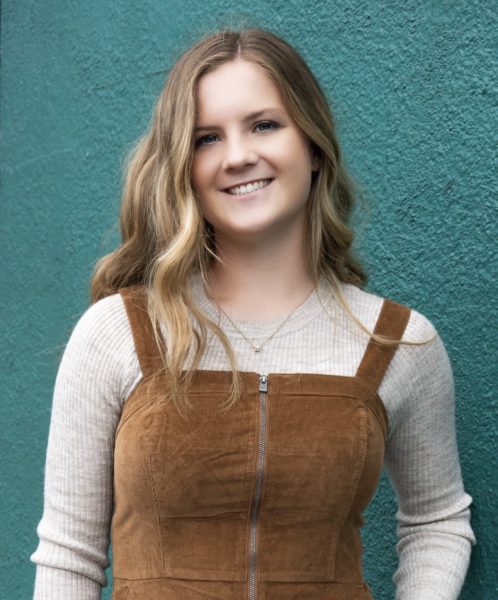 Sydney is a sophomore English journalism major and education minor. At the Brain Institute she is an administrative assistant, who hopes to use the experience to gain useful skills that will help her succeed in future endeavors. When she is not working at the Brain Institute, she spends her time writing. She has published articles in the Voice of Orange County and Chapbook magazine.
Sydney is a sophomore English journalism major and education minor. At the Brain Institute she is an administrative assistant, who hopes to use the experience to gain useful skills that will help her succeed in future endeavors. When she is not working at the Brain Institute, she spends her time writing. She has published articles in the Voice of Orange County and Chapbook magazine.
Liad Mudrik, Inbal Gur Arie, Yoni Amir, Yarden Shir, Pamela Hieronymi, Uri Maoz, Timothy O’Connor, Aaron Schurger, Manuel Vargas, Tillmann Vierkant, Walter Sinnott-Armstrong, Adina Roskies. (2022). Free will without consciousness?. Trends in Cognitive Sciences. https://doi.org/10.1016/j.tics.2022.03.005
Debbie Nguyen
Operations Manager
Quick Navigation
Debbie Nguyen
Operations Manager

Debbie studied Psychology and Chemistry at Chapman University. They began as an Administrative Assistant at the Brain Institute in Spring 2022. She is passionate about advocating for marginalized populations, especially as it relates to representation in academia. Debbie aims to pursue a career in Public Health and Clinical Research.
Liang, D., Frederick, D. A., Lledo, E. E., Rosenfield, N., Berardi, V., Linstead, E., & Maoz, U. (2022). Examining the utility of nonlinear machine learning approaches versus linear regression for predicting body image outcomes: The US Body Project I. Body Image, 41, 32-45. https://doi.org/10.1016/j.bodyim.2022.01.013

Sophie Kelly
Videographer
Quick Navigation
Sophie Kelly
Videographer

Sophie Kelly is a Television Writing and Production Major from Kansas City, Missouri. She joined the Brain Institute as a videographer in 2022, and loves to learn new things about psychology through the filmmaking process. Outside of videography, she is a Film Music minor, and enjoys playing the bass, acting, and writing.
Schurger, A., & Graziano, M. (2022). Consciousness explained or described?. Neuroscience of Consciousness, 2022(2), niac001. https://doi.org/10.1093/nc/niac001
Wong, A., Merholz, G. & Maoz, U. (2021). Characterizing human random-sequence generation in competitive and non-competitive environments using Lempel–Ziv complexity. Sci Rep 11, 20662. https://doi.org/10.1038/s41598-021-99967-6
Amy Whitmarsh
Quick Navigation
Amy Whitmarsh

Amy Whitmarsh graduated from Chapman in fall 2022 with major in health sciences major and a neuroscience minor. She has been a research assistant with the Brain Institute since spring 2021. While doing research, Amy has focused on EEG and the use of the float-pod. She plans on becoming a PA, but has yet to decide what specialty.
Lashgari E, Maoz U (2021). Dimensionality reduction for classification of object weight from electromyography. PLoS ONE 16(8): e0255926. https://doi.org/10.1371/journal.pone.0255926
Omura, Y., Kipke, J.P., Salavatian, S., Afyouni, A.S., Wooten, C., Herkenham, R.F., Maoz, U., Lashgari, E., Dale, E.A., Howard-Quijano, K. and Mahajan, A., 2021. Spinal Anesthesia Reduces Myocardial Ischemia–triggered Ventricular Arrhythmias by Suppressing Spinal Cord Neuronal Network Interactions in Pigs. Anesthesiology, 134(3), pp.405-420. https://doi.org/10.1097/ALN.0000000000003662
Lashgari, E., Ott, J., Connelly, A., Baldi, P., & Maoz, U. (2021). An end-to-end CNN with attentional mechanism applied to raw EEG in a BCI classification task. Journal of Neural Engineering. https://doi.org/10.1088/1741-2552/ac1ade
Schurger, A., Pak, J., & Roskies, A. L. (2021). What Is the Readiness Potential?. Trends in Cognitive Sciences. https://doi.org/10.1016/j.tics.2021.04.001
Quick Navigation
Irving Kirsch - Antidepressants and the Placebo Effect
Omura, Y., Kipke, J. P., Salavatian, S., Afyouni, A. S., Wooten, C., Herkenham, R. F., … & Mahajan, A. (2021). Spinal Anesthesia Reduces Myocardial Ischemia–triggered Ventricular Arrhythmias by Suppressing Spinal Cord Neuronal Network Interactions in Pigs. Anesthesiology, 134(3), 405-420. https://doi.org/10.1097/ALN.0000000000003662
Schotanus, P., & Schurger, A. (2020). Spontaneous Volatility: Fooled by Reflexive Randomness. Journal of Behavioral Finance, 1-13. https://doi.org/10.1080/15427560.2020.1771715
Doerig, A., Schurger, A., & Herzog, M. H. (2020). Hard criteria for empirical theories of consciousness. Cognitive Neuroscience, 1-22. https://doi.org/10.1080/17588928.2020.1772214
Chandravadia, N., Liang, D., Schjetnan, A.G.P., Carlson, A., Faraut, M., Chung, J.M., Reed, C.M., Dichter, B., Maoz, U., Kalia, S.K. and Valiante, T.A., 2020. A NWB-based dataset and processing pipeline of human single-neuron activity during a declarative memory task. Scientific Data, 7(1), p.78. https://doi.org/10.1038/s41597-020-0415-9
Lashgari, E., Liang, D., & Maoz, U. (2020). Data Augmentation for Deep-Learning-Based Electroencephalography. Journal of Neuroscience Methods. https://doi.org/10.1016/j.jneumeth.2020.108885
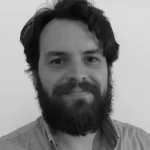
Mathieu Landry
Postdoc
Quick Navigation
Mathieu Landry
Postdoc

Dr. Mathieu Landry completed his Ph.D. in cognitive neuroscience at McGill University. Broadly, his research explores how cognition (e.g., attention, anticipation, executive control) shapes consciousness (i.e., how we subjectively experience the world and our own mind). His work has primarily focused on the overlapping dynamics between attention, perception and metacognition, while he also investigated and published several papers on hypnosis and suggestions. His research combines various methods, including neurophysiology (i.e., electro- and magnetoencephalography), experimental strategies from psychophysics and cognitive psychology, and a variety of analytical strategies (e., computational modelling, machine learning).
Tomáš Dominik
Postdoc
Quick Navigation
Tomáš Dominik
Postdoc

Dr. Dominik received his Ph.D. in December 2019 after defending a dissertation thesis pertaining various aspects of Libet’s experiment. His interests lie in the overlap between psychology, psychophysiology and neuroscience of volition. Specifically, he studies the reliability of introspective reports of motor intention or the origins of brain potentials preceding voluntary or pre-contemplated movements. He also previously led a project of complex replication of Libet’s experiment. He uses EEG, various psychophysiological methods (ECG, EDA, EMG, EOG, etc.), and behavioral methods for his research.
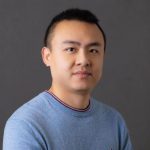
Tian Lan
Senior Research Engineer | Operations Lead
Quick Navigation
Tian Lan
Senior Research Engineer | Operations Lead
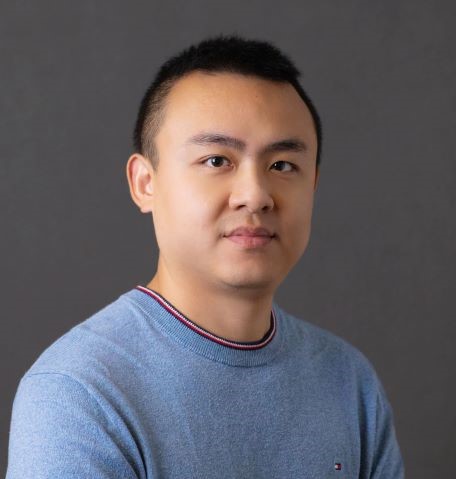
Tian Lan is a biomedical engineer with the Brain Institute. He holds an M.S. in Biomedical Engineering from UC Irvine. He oversees the equipment and experiments in the lab, as well as the day-to-day operations of the institute
Tian is interested in using EEG, EMG, TMS, eye-tracking, VR and other tools in various environments to assess human brain activities and physiological changes, in particular, the underlying mechanisms of consciousness in decision making and voluntary actions.
Uri Maoz
Assistant Professor
Quick Navigation
Uri Maoz
Associate Professor
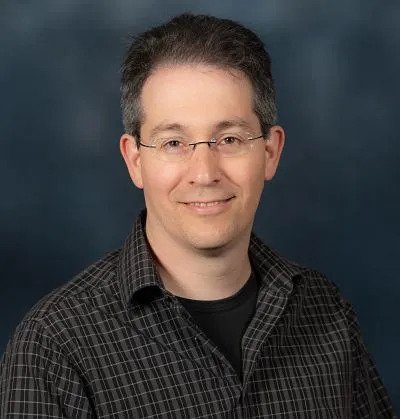
Dr. Uri Maoz joined Chapman University in 2017 as an Assistant Professor of Computational Neuroscience at Crean College and at the Institute for Interdisciplinary Brain and Behavioral Sciences. He is also an affiliate at Schmid College of Science and Technology and at the Fowler School of Engineering. His research lies at the intersection of volition, decision-making, and moral choice. He uses a combination of empirical techniques (e.g., EEG, intracranial recordings, behavioral studies) and theoretical modeling to develop a computational account of volition, with an emphasis on the decision-making processes that lead to voluntary action and on the role of consciousness in such processes. In particular, he uses machine-learning to carry out online, real-time, closed-loop analysis of neural data, as it is recorded. He is further interested in the legal, ethical, conceptual, and economic implications of this work.
Dr. Maoz earned a B.Sc. in computer science and general humanistic studies and a Ph.D. in neural computation from the Hebrew University. As part of his graduate studies, he was a visiting student at the Weizmann Institute of Science and the Collège de France. He was then a postdoctoral scholar at Caltech and at the Cedars Sinai Medical Center. Later, he was a researcher at the Department of Neurosurgery at UCLA and then faculty at the Department of Psychology there. He serves as a Visiting Associate in Biology and Bioengineering at Caltech. He also directs a large, international project comprising 17 neuroscientists and philosophers, who aim to understand how the brain enables conscious control of human decisions and actions.
Amir Raz
Founding Director, Professor
Quick Navigation
Amir Raz
Founding Director, Professor

Dr. Raz is Professor of Psychological and Brain Sciences and Founding Director of the Brain Institute at Chapman University, and Professor in the Department(s) of Psychiatry (Psychology, Neurology and Neurosurgery) at McGill University (Canada). His research spans the cognitive neuroscience of attention, placebos, and altered planes of consciousness.
Dr. Raz is a world leader in unlocking the brain substrates of attention and consciousness. Dr. Raz is Professor of Psychiatry, Neurology & Neurosurgery, and Psychology; Senior Investigator in the Lady Davis Institute for Medical Research of the Jewish General Hospital; and a member of the Montreal Neurological Institute. He heads both the Cognitive Neuroscience Laboratory at McGill University and the Clinical Neuroscience and Applied Cognition Laboratory at the Institute for Community and Family Psychiatry.
Former member of the McGill Board of Governors and Editor-in Chief of a specialty peer-reviewed journal, Professor Raz combines cutting-edge science and trailblazing research with community outreach, science teaching, and interdisciplinary education in the health and psychological sciences. With peer reviewed publications in journals such as Nature, Nature Reviews Neuroscience, The Lancet, and Proceedings of the National Academy of Sciences, Professor Raz has received multiple accolades, ranging from a Young Investigator Award from the National Alliance for Research on Schizophrenia and Depression and the American Psychological Association’s Early Career Award, to Fellow of the Society for Clinical and Experimental Hypnosis and Honorary Fellow of the Golden Key Society.
Dr. Raz’s research interests span the neural and psychological substrates of attention, suggestion, placebos, and self-regulation. A former magician and musician, he also conducts research into the cognitive neuroscience of deception, ownership, altered consciousness, and atypical cognition. Using imaging of the living human brain, genetics, and other techniques, his research brings together basic and clinical science.
Alice Wong
Postdoc
Quick Navigation
Alice Wong
Postdoc

Alice is a current postdoc at the Brain Institute. She obtained her PhD in Computational and Data Sciences from Chapman University in 2022, and she has a B.A in Psychology from UCLA. Her areas of research interests include characterising the extent of how random human generated sequences can be, and the neuroscience and temporal dynamics of voluntary action.
Andy Liang
Postdoc
Quick Navigation
Andy Liang
Postdoc

Andy is a postdoc at the Brain Institute who obtained his PhD in Computational and Data Sciences from Chapman University in 2022. His research is mainly focused on computational methods in neuroscience and deep learning. During his time as a student at Chapman, he has worked on many different datasets. For Andy, the data that are collected from the brain is the most exciting data to analyze. He believes the brain and cognition are still mysterious to us and understanding how the they work will make an impact on how we understand human beings.
Lucas Jeay-Bizot
PhD Student
Quick Navigation
Lucas Jeay-Bizot
PhD Student

Lucas Jeay-Bizot is an incoming PhD student in the Computational and Data Science program at Chapman University. Lucas received an MA in Mathematics and Philosophy from the University of Glasgow and will be graduating with an MSc in Cognitive Science from the University of Vienna. His research interests cover both the neuroscientific and philosophical investigations of the phenomenon of free will. During his PhD he plans to investigate different aspects of voluntary actions using EEG and machine learning techniques.
Travers, E., Khalighinejad, N., Schurger, A., & Haggard, P. (2020). Do readiness potentials happen all the time? NeuroImage, 206, 116286. https://doi.org/10.1016/j.neuroimage.2019.116286
Aaron Schurger
Assistant Professor
Quick Navigation
Aaron Schurger
Assistant Professor

Dr. Schurger’s research is focused on uncovering the distinction between conscious and non-conscious neural information processing and on the neural mechanisms of volition and self-initiated action. He uses a variety of techniques in his research including neuroimaging, behavioral psychophysics, machine learning, and computational modeling.
Jake Gavenas
PhD Student
Quick Navigation
Jake Gavenas
PhD Student

Jake is a PhD student with the Brain Institute and Chapman University’s Computational and Data Sciences program. He graduated from UCLA in June 2017 with a B.A. in Psychology and a minor in Mathematics. His research interests include the neural mechanisms of voluntary action, the timing of unconscious and conscious factors in decision making, and mathematical and computational modeling of these and related phenomena. He is also engaged with the philosophical debate surrounding what the neuroscience of volition can tell us about free will.
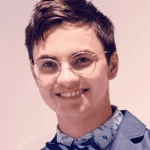
Nico Barrett
Animation Artist/Graphic Designer
Quick Navigation
Nico Barrett
Animation Artist/Graphic Designer

A recent grad of Chapman University with a BFA in Animation and Visual Effects, Nico is an illustrator, animator, and graphic designer for the Brain Institute who is interested in pursuing a career in TV animation.
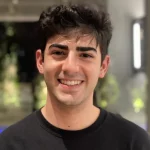
Ori Garibi
Research Assistant
Quick Navigation
Ori Garibi
Research Assistant

Ori is a Freshman at Chapman University majoring in Computer Engineering. He is working on developing the VR Driving Simulator, by creating a Unity environment where users can drive a realistic car in virtual reality.
Emma Chen
Quick Navigation
Emma Chen

Emma Chen is a sophomore at Chapman University majoring in Health Sciences and minoring in Neuroscience. She is involved in the EEG biofeedback, microdosing, and TMS-agency projects. Her research interests lie among the intersection between neuroscience, philosophy, and law.
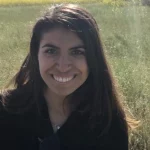
Caitlyn Chavez
PhD Student
Quick Navigation
Caitlyn Chavez
PhD Student

Caitlyn is a PhD student at the Brain Institute and MLAT lab in Chapman University’s Computational and Data Sciences program. She graduated from UCSB in June 2016 with a B.S. in Chemistry. In her research, Caitlyn focuses on deep learning, computer vision, and signal processing in solving problems in precision medicine and biomedical imaging.
Aaron Schurger on CogNation
Aaron Schurger talks about his research on the meaning of the “readiness potential” on CogNation.
Mudrik, L., Levy, D. J., Gavenas, J., & Maoz, U. (2020). Studying volition with actions that matter: Combining the fields of neuroeconomics and the neuroscience of volition. Psychology of Consciousness: Theory, Research, and Practice, 7(1), 67–86. https://doi.org/10.1037/cns0000200
Jin Fan - Anterior Insular Cortex Plays a Critical Role in Interoceptive Awareness: Implications for Consciousness
On November 11th, 2019, the Brain Institute hosted Dr. Jin Fan for a lecture with a topic of “Anterior Insular Cortex Plays a Critical Role in Interoceptive Awareness: Implications for Consciousness“. This lecture is sponsored by The Federico & Elvia Faggin Foundation and is the 2nd lecture of this Faggin Lectures Series.
Dr. Jin Fan is a Professor of Psychology at Queens College, the City University of New York. His research focuses on cognitive control which is implemented by attentional processes and corresponding specialized networks – the attentional networks. Through independent research and collaboration, he has conducted behavioral, developmental, and patient-based studies using functional magnetic resonance imaging, event-related potentials, genetics, and computational modeling to investigate the anatomy, circuitry, pathology, and development of attentional networks.
Maoz, U., Yaffe, G., Koch, C., & Mudrik, L. (2019). Neural precursors of deliberate and arbitrary decisions in the study of voluntary action. Elife, 8, e39787. https://doi.org/10.7554/eLife.39787.001
Oh, J., Yun, K., Maoz, U., Kim, T. S., & Chae, J. H. (2019). Identifying depression in the National Health and Nutrition Examination Survey data using a deep learning algorithm. Journal of affective disorders, 257, 623-631. https://doi.org/10.1016/j.jad.2019.06.034
Aaron Schurger and Uri Maoz in The Atlantic
Hill, B.L., Brown, R., Gabel, E., Rakocz, N., Lee, C., Cannesson, M., Baldi, P., Loohuis, L.O., Johnson, R., Jew, B. and Maoz, U., 2019. An automated machine learning-based model predicts postoperative mortality using readily-extractable preoperative electronic health record data. British journal of anaesthesia, 123(6), pp.877-886. https://doi.org/10.1016/j.bja.2019.07.030
Maoz U and Listead E. (2019) Brain imaging and artificial intelligence, in Raz A. and Thibault R., (Eds). The Dark Side of Brain Imaging. Elsevier Press.
Michael I. Posner - Enhancing Brain Networks of Conscious Control
On May 3rd, 2019, the Brain Institute hosted Dr. Michael Posner for a lecture with a topic of “Enhancing Brain Networks of Conscious Control“. This lecture is sponsored by The Federico & Elvia Faggin Foundation and is the inaugural lecture of this Faggin Lectures Series.
Michael I. Posner is an American psychologist, the editor of numerous cognitive and neuroscience compilations, and an eminent researcher in the field of attention. He is currently an emeritus professor of psychology at the University of Oregon, and an adjunct professor at the Weill Medical College in New York.
ABSTRACT
The problem of consciousness can be divided into awareness and control. This lecture concentrates on the mechanisms of control. Control of behavior is exercised through a brain network involving the anterior cingulate, anterior insula and underlying striatum. The efficiency of this network can be examined through the ability to resolve conflict among competing responses. This network develops in early childhood and comes to control our voluntary responses. Pathways through which this mechanism operates can be improved by experience, for example, by 2-4 weeks of meditation training. Meditation training enhances intrinsic frontal theta. We have shown in mice, inducing frontal theta with optogenetics enhances white matter connectivity. We are testing the possibility that enhancing intrinsic theta may improve white matter anywhere in the human brain. If this is possible we may be able to help people with disorders that involve reduced connectivity. By dividing the study of consciousness into more elementary issues considerable progress has and can be made.
LECTURE
Q&A
Maoz, U., Sita, K. R., Van Boxtel, J. J., & Mudrik, L. (2019). Does it matter whether you or your brain did it? An empirical investigation of the influence of the double subject fallacy on moral responsibility judgments. Frontiers in psychology, 10, 950. https://doi.org/10.3389/fpsyg.2019.00950
5 Questions about "Neuroscience and Philosophy of Free Will"
During the Second International Conference on Neuroscience and Free Will, we invited some of the conference attendees for an interview, during which we asked them five questions about neuroscience and philosophy of free will.
Below are the five questions, the highlights of the interview, as well as the full version of the interview:
1. What do you see as the biggest promise of the field of neuroscience of free will?
2. What are the greatest challenges that you think this field faces?
3. Please opine on how can an abstract notion like free will be probed experimentally.
4. What are the advantages and challenges in collaborations between neuroscientists and philosophers when studying free will?
5. On this note, do you think we have free will?
Highlights
Full
The Second International Conference on Neuroscience and Free Will
We hosted the Second International Conference on Neuroscience and Free Will from March 14th to March 18th, 2019. The conference was organized by Uri Maoz.
This conference has been made available by the generous support of the Fetzer Franklin Fund and additional support from the President’s Office and Crean College at Chapman University.
Below are some highlights from the conference.
Conference Sessions (Click on any title to view the corresponding abstract.)
FRIDAY MARCH 15
Morning Session: Are We Going To Find Intentions In The Brain?
9:00am – 9:45am Mark Hallett
Are we going to find intentions in the brain?
9:45am – 10:30am Sebo Uithol
On intentions and the real causes of our actions
11:00am – 12:00pm
Philosopher Response: Richard Holton
Panel: Mark Hallett, Richard Holton, Aaron Schurger, Sebo Uithol, Gideon Yaffe
Special Session: What Can Neuroscience Contribute to the Philosophical Debate on Free Will?
Click on the participant’s name to view the question(s) they will pose.
1:30pm – 2:30pm Alfred Mele, Gideon Yaffe, Walter Sinnott-Armstrong
Afternoon Session: Freedom In A Social Setting (Click for webcast)
3:00pm – 3:45pm Marcel Brass
The influence of free will beliefs on intentional motor control and social perception
3:45pm – 4:30pm Hans Liljenström
A neuro-cognitive approach to free will in social interaction
5:00pm – 6:00pm
Philosopher Response: Eddy Nahmias
Panel: Marcel Brass, Hans Liljenström, Eddy Nahmias, Jonathan Schooler, Till Vierkant
SATURDAY MARCH 16
Morning Session: The Role of Randomness (Click for webcast)
8:30am – 9:15am Björn Brembs
Conceptualizing freedom as a composite biological process
9:15am – 10:00am Gabriel Kreiman
Do neurons play dice? And does the answer matter for free will?
10:30am – 11:30am (Click for webcast)
Philosopher Response: Tim O’Connor
Panel: Björn Brembs, Gabriel Kreiman, Tim O’Connor, Uri Maoz, Peter van Inwagen
Poster Session (Click for information)
12:00pm – 2:00pm
Afternoon Session: Are More Ecological Studies Too Confounded? (Click for webcast)
2:00pm – 2:45pm Uri Maoz
Do the Libet results generalize to deliberate decisions?
2:45pm – 3:30pm Liad Mudrik
Studying ‘real-life’ consciousness and volition: promise, challenges and perils
4:00pm – 5:00pm (Click for webcast)
Philosopher Response: Pamela Hieronymi
Panel: Pamela Hieronymi, Liad Mudrik, Uri Maoz, Gary Watson, Patrick Haggard
SUNDAY MARCH 17
Morning Session: Causality in Neuroscience (Click for webcast)
8:30am – 9:15am John-Dylan Haynes
Challenges to causal interpretation of decision-predictive brain signals
9:15am – 10:00am Frederick Eberhardt
Causal Structure Discovery from Neural Data
10:30am – 11:30am (Click for webcast)
Philosopher Response: Tim Bayne
Panel: Tim Bayne, Frederick Eberhardt, John-Dylan Haynes, Chris Hitchcock, Paavo Pylkkanen
Student-Led Session (Click for webcast)
12:00pm – 2:00pm
Panel Discussion: (Click for webcast)
Ned Block, Patrick Haggard, Walter Sinnott-Armstrong, Peter Tse
To facilitate more student engagement with the conference and their topics of interest, we have a student-led session. Here, the students decide on the format and the content. The first part of the session comprises of group discussions of 6 topics. There will be 3 simultaneously discussed topics for 40 minutes and then 3 others for the next 40 minutes. Then, in the second part of the session, there will be a panel discussion for 30 minutes.
Click here for details about the topics and participants.
Afternoon Session: What Is The Readiness Potential? (Click for webcast)
2:00pm – 2:45pm Aaron Schurger
The time course of neural activity predictive of impending movement
2:45pm – 3:30pm Patrick Haggard
The Bereitschaftspotential and the cognitive neuro-ontology of voluntary action
4:00pm – 5:00pm (Click for webcast)
Philosopher Response: Adina Roskies
Panel: Mark Balaguer, Patrick Haggard, Mark Hallet, Adina Roskies, Aaron Schurger
Poster Session Details (Click for webcast)
(Saturday 12pm – 2pm)
Click on any title to view the corresponding abstract.
Deciding or instructed to move or not move
Sanaz Attaripour Isfahani (National Institute of Neurological Disorders and Stroke)
Picking and choosing. An ERP study of the neural correlates of meaningless and meaningful actions
Sofia Bonicalzi (Ludwig Maximilian University of Munich)
The Knobe effect attenuated in autism spectrum disorder and its neural basis
Kazuki Iijima (Tamagawa University)
Bio-Agency and Natural Freedom
Anne Sophie Meincke (University of Southampton)
Using placebo machines to influence agency over thoughts, attitudes, and behaviours
Jay Olson (McGill University)
Alice Pailhes (Goldsmiths University of London)
Do we know what we are about to do? A real-time EEG study of intention awareness
Elisabeth Parés Pujolràs (University College London)
Interpretive-Sensory Access to One’s Will
Paulius Rimkevicius (Vilnius University)
Yarden Shir (Tel Aviv University)
Testing the Conditional Ability to Do Otherwise in the Court of Popular Opinion
Siyuan Yin (Duke University)
Freedom and free will: impact of phrasing on intuitions
Jake Gavenas (Chapman University Brain Institute)
Using Pupillometry to Assess Conscious Intention
Andy Liang (Chapman University Brain Institute)
Timing the onset of deliberate and arbitrary choices
Alice Wong (Chapman University Brain Institute)
Compact 3 DOF Driving Simulator using Immersive Virtual Reality for ecological decision making
Jungsu Pak (Chapman University Brain Institute)
Student-Led Session Details
(Sunday 12pm – 2pm)
12:00pm – 12:40pm
| Topic | Moderator |
Are we going to find intentions in the brain? | Jake Gavenas |
The role of randomness | Jungsu Pak |
| Causality in neuroscience | Alice Wong |
12:40pm – 1:20pm
Topic | Moderator |
Freedom in a social setting | Jungsu Pak |
Will findings generalize to distal intentions? | Alice Wong |
Noise and responsibility | Jake Gavenas |
1:20pm – 2:00pm
Panel Discussion
Students are welcome to add questions for the 6 topic discussions and for the panel using this link. Only the students can edit the spreadsheet of questions, but everyone can view the questions.
The Grand Opening of the Brain Institute
The Institute for Interdisciplinary Brain and Behavioral Sciences (The Brain Institute) officially opens on March 13th, 2019.
The grand opening includes a grand opening ceremony, ribbon cutting and open house of the facility.
Watch the video below for the highlights!
Brain Institute Receives Over $7 Million for Research on Neurophilosophy of Free Will
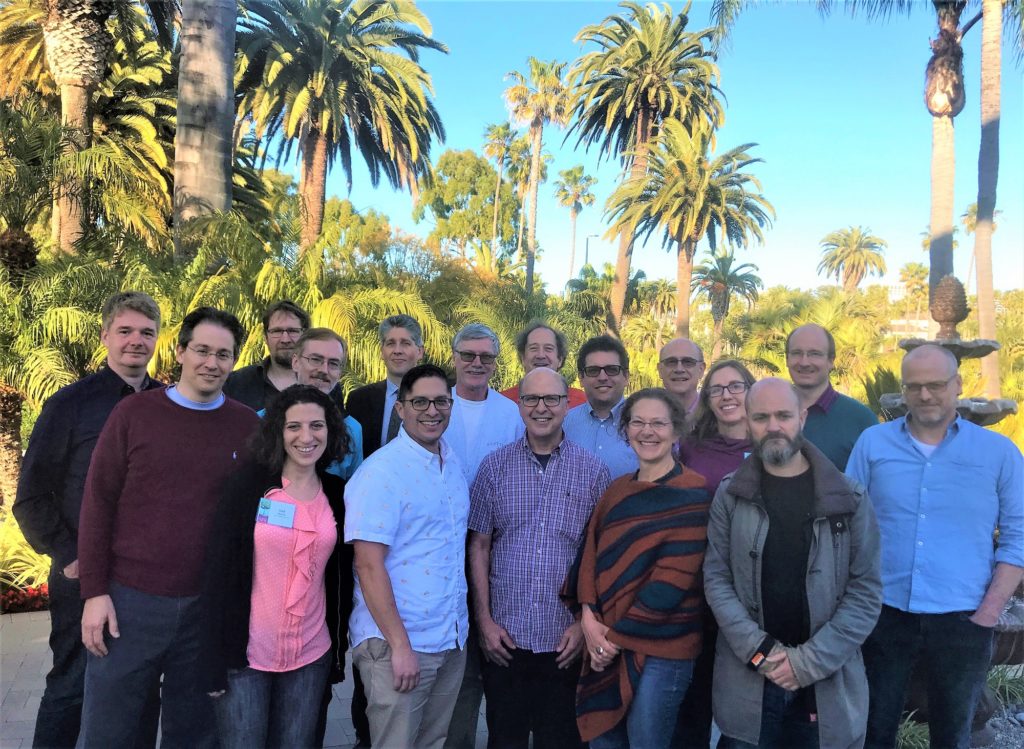
Front (left to right):
Uri Maoz, Chapman University/UCLA/Caltech (Project Leader); Liad Mudrik, Tel Aviv University; Manuel Vargas, UCSD (collaborator on the project); Alfred Mele, Florida State University; Adina Roskies, Dartmouth College; Tim Bayne, Monash University; Gideon Yaffe, Yale University
Back (left to right):
John-Dylan Haynes, Charite – Universitätsmedizin Berlin; Tillmann Vierkant, University of Edinburgh; Tim O’Connor, Indiana University Bloomington; Patrick Haggard, University College London; Hans Liljenström, Swedish University of Agricultural Sciences /Sigtuna Foundation; Walter Sinnott-Armstrong, Duke University; Aaron Schurger, Chapman University/INSERM; Mark Hallett, NIH; Pamela Hieronymi, UCLA; Frederick Eberhardt, Caltech (collaborator on the project)
Not in the photo:
Ned Block, NYU; Gabriel Kreiman, Harvard; Ueli Rutishauser, Cedars Sinai Medical Center/Caltech (collaborator on the project)
The newly-minted Institute for Interdisciplinary Brain and Behavioral Science (The Brain Institute) at Chapman University, with Dr. Uri Maoz as project leader, is the recipient of a total of $7.04 million to study how the human brain enables conscious control of decisions and actions. The John Templeton Foundation funded $5.34 million; the Fetzer Institute funded $1.55 million; and the remaining $150,000 comes from the Fetzer Memorial Trust. This is Chapman’s largest non-federal research grant to date. With the Chapman Brain Institute serving as the central hub, this grant supports research efforts at 17 universities spanning four continents: including Charité Berlin (Germany), Dartmouth, Duke, Florida State University, Harvard, Indiana University Bloomington, NIH, Monash University (Australia), NYU, Sigtuna (Sweden), Tel Aviv University (Israel), University College London (UK), University of Edinburgh (UK), UCLA, and Yale.
The project will launch at an international conference on the Neuroscience of Free Will that the Brain Institute and Crean College of Health and Behavioral Sciences at Chapman University will host March 14-18. A celebratory Grand Opening Dedication and Ribbon Cutting is scheduled for 10:30 a.m. Wednesday, March 13, at the Harry and Diane Rinker Health Science campus, located at 14725 Alton Parkway, Irvine. The event and light brunch to follow is open to the entire campus community.
“We were pleased to establish Chapman’s Brain Institute and to bring the faculty associated with it to Chapman University last year,” said Daniele Struppa, Ph.D., Chapman University president. “Their approach to research reflects Chapman’s goal of combining research with teaching and involving undergraduate and graduate students at all levels in the process. We are grateful for this grant from the Templeton Foundation and the Fetzer Institute, which recognizes Chapman as a leader in this developing field.”
“This grant aims to create a new field in the study of the brain—the neurophilosophy of free will,” said Uri Maoz, Ph.D., assistant professor of psychology and computational neuroscience at Chapman University. “The extent and scope of human free will have been debated by philosophers for millennia. In recent decades, neuroscientists have joined the discussion, leading to some interesting discoveries. The current project, however, represents a four-year effort forging structured, close collaborations on these questions between eight neuroscientists (including Dr. Aaron Schurger, assistant professor of psychology, the latest faculty recruit to the Brain Institute at Chapman) and nine philosophers from around the world. Hopefully, in 10 years we will look back at the grant and say that’s where it all started,” said Dr. Maoz.
“This large-scale investment, by the John Templeton Foundation and the Fetzer Institute, comes to the Brain Institute even before its official launch next month,” said Amir Raz, Ph.D., Chapman University professor of psychology and brain sciences and director of the Brain Institute. “Work at the Brain Institute addresses fundamental questions of human experience: do we have free will? Are we, in fact, free to do what we wish? What is the role of consciousness in our decisions? We are grateful for the opportunities the combined grant offers as well as the testament it provides to confidence in our work.”
“The Templeton Foundation and Fetzer Institute grant acknowledge that consequential, complex questions find answers only when approached through the lenses of multiple disciplines and their research techniques,” said Janeen Hill, Ph.D., dean of Crean College. “Chapman University’s and Crean College’s commitment to brain science and its inherent interdisciplinarity is reinforced by the significance of this combined grant.”
Entitled “Consciousness and Free Will: A Joint Neuroscientific-Philosophical Investigation,” the grant aims to advance efforts in the neurophilosophy of free will. For example, researchers at the Brain Institute and their collaborators will use advanced analysis techniques of brain activity and strive to decode decisions and actions before they take place. Or they will use various techniques to compare human brain activity when people make arbitrary decisions (e.g., when asked to randomly raise their left or right hand) and deliberate ones (e.g., when asked to raise their left or right hand to donate to one charity or another).
“This grant, placing Chapman as a leader in neuroscience, reflects our deepening commitment to research and to academic excellence,” said Glenn Pfeiffer, Ph.D., provost of Chapman University. “This announcement comes soon after the recent elevation of Chapman University to Carnegie Classification R2, signifying ‘high research activity.’ We have never been stronger as a research institution than we are right now.”
“In fact,” said Thomas Piechota, Ph.D., PE, vice president of research, “this is an opportune time to partner with Chapman University. The research being conducted by the Brain Institute and throughout Chapman is exciting and innovative. Our faculty are exemplary researchers and the involvement of students of every level – including first-year undergraduates – is a fundamental part of the personalized education that we offer.”
Hosted at the Rinker Health Science campus in Irvine, as well as on the Orange campus, the Brain Institute comprises a network of interdisciplinary researchers who conduct empirical investigations into the cognitive neuroscience of altered planes of consciousness, neuropsychology, volition, formal models of higher brain functions among other fields. Our work draws on clinical populations, healthy volunteers, and innovations in artificial intelligence, machine learning, and big data.
“Questions about consciousness and free will are of enduring interest in both philosophy and the sciences. This project will feature field-leading researchers on these two topics, using rigorous and collaborative methods to advance our understanding of both of them. It is, therefore, a perfect fit for the John Templeton Foundation, and we are pleased to support Chapman in this initiative,” said John Churchill, director of philosophy and theology programs at the John Templeton Foundation.
“We are drawn to this work because of its cutting-edge exploration of free will, the breadth of the research effort Chapman University has developed, and the scale of this major funding collaboration with Templeton,” said Mohammed Mohammed, Fetzer Institute program director of research, discovery, and development. “We are excited about this venture into the intersection of philosophy and neuroscience.”
Alessandra Buccella
Postdoc
Quick Navigation
Alessandra Buccella
Postdoc

Dr. Buccella received her PhD in philosophy from the University of Pittsburgh in 2020. At the core of her work lies the relationship between so-called ‘subjective’ and ‘objective’ aspects of experience. On the one hand, experience discloses the world to us, making its objective features available for knowledge and action. On the other hand, experience is irreducibly subjective and perspectival. In her research, Dr. Buccella explores the co-dependent notions of objectivity and perspective in different contexts, at the interface between philosophy, psychology, and neuroscience. More specific topics include perceptual constancy, the role of mental representations in cognitive science, feminist themes in enactive-embodied theories of cognition, and the philosophical foundations of machine learning.
İşcan, Z., Schurger, A., Vernet, M., Sitt, J. D., & Valero-Cabré, A. (2018). Pre-stimulus theta power is correlated with variation of motor evoked potential latency: a single-pulse TMS study. Experimental Brain Research, 236(11), 3003-3014. https://doi.org/10.1007/s00221-018-5359-3
Schwiedrzik, C. M., Melloni, L., & Schurger, A. (2018). Mooney face stimuli for visual perception research. PloS one, 13(7), e0200106. https://doi.org/10.1371/journal.pone.0200106
Hill, B., Brown, R., Gabel, E., Lee, C., Cannesson, M., Loohuis, L. O., … & Sankararaman, S. (2018). Preoperative predictions of in-hospital mortality using electronic medical record data. bioRxiv, 329813. https://doi.org/10.1101/329813
Schurger, A. (2018). Specific relationship between the shape of the readiness potential, subjective decision time, and waiting time predicted by an accumulator model with temporally autocorrelated input noise. Eneuro, 5(1). https://10.1523/ENEURO.0302-17.2018
Schurger, A., Faivre, N., Cammoun, L., Trovó, B., & Blanke, O. (2017). Entrainment of voluntary movement to undetected auditory regularities. Scientific Reports, 7(1), 1-7. https://10.1038/s41598-017-15126-w
Titiz, A. S., Hill, M. R., Mankin, E. A., Aghajan, Z. M., Eliashiv, D., Tchemodanov, N., … & Behnke, E. (2017). Theta-burst microstimulation in the human entorhinal area improves memory specificity. Elife, 6, e29515. https://doi.org/10.7554/eLife.29515
Khalighinejad, N., Schurger, A., Desantis, A., Zmigrod, L., & Haggard, P. (2018). Precursor processes of human self-initiated action. Neuroimage, 165, 35-47. https://doi.org/10.1016/j.neuroimage.2017.09.057
Schurger A (2017) The Neuropsychology of Free Will, in The Blackwell Companion to Consciousness, S. Schneider & M. Velmans Eds., John Wiley & Sons, West Sussex, UK.
Marchesotti, S., Martuzzi, R., Schurger, A., Blefari, M. L., del Millán, J. R., Bleuler, H., & Blanke, O. (2017). Cortical and subcortical mechanisms of brain‐machine interfaces. Human brain mapping, 38(6), 2971-2989. https://doi.org/10.1002/hbm.23566
Schurger, A., Gale, S., Gozel, O., & Blanke, O. (2017). Performance monitoring for brain-computer-interface actions. Brain and cognition, 111, 44-50. https://doi.org/10.1016/j.bandc.2016.09.009
Webb, T. W., Igelström, K. M., Schurger, A., & Graziano, M. S. (2016). Cortical networks involved in visual awareness independent of visual attention. Proceedings of the National Academy of Sciences, 113(48), 13923-13928. https://doi.org/10.1073/pnas.1611505113
Gale, S., Prsa, M., Schurger, A., Gay, A., Paillard, A., Herbelin, B., … & Blanke, O. (2016). Oscillatory neural responses evoked by natural vestibular stimuli in humans. Journal of neurophysiology, 115(3), 1228-1242. https://doi.org/10.1152/jn.00153.2015
Maoz, U., & Yaffe, G. (2016). What does recent neuroscience tell us about criminal responsibility?. Journal of Law and the Biosciences, 3(1), 120-139. https://doi.org/10.1093/jlb/lsv051
Schurger, A., Mylopoulos, M., & Rosenthal, D. (2016). Neural antecedents of spontaneous voluntary movement: a new perspective. Trends in Cognitive Sciences, 20(2), 77-79. https://doi.org/10.1016/j.tics.2015.11.003
Maoz, U., Mudrik, L., Rivlin, R., Ross, I., Mamelak, A., & Yaffe, G. (2015). On reporting the onset of the intention to move. Surrounding free will: philosophy, psychology, neuroscience (Mele A, ed), 184-202.
Evans, N., Gale, S., Schurger, A., & Blanke, O. (2015). Visual feedback dominates the sense of agency for brain-machine actions. PloS one, 10(6), e0130019. https://doi.org/10.1371/journal.pone.0130019
Schurger, A., Kim, M. S., & Cohen, J. D. (2015). Paradoxical interaction between ocular activity, perception, and decision confidence at the threshold of vision. PloS one, 10(5), e0125278. https://doi.org/10.1371/journal.pone.0125278
Schurger A, Uithol S (2015) Nowhere and everywhere: the causal origin of voluntary action. Review of Philosophy and Psychology. https://10.1007/s13164-014-0223-2
Mudrik, L., & Maoz, U. (2014). “Me & My Brain”: Exposing Neuroscience’s Closet Dualism. Journal of Cognitive Neuroscience, 27(2), 211-221. https://doi.org/10.1162/jocn_a_00723
King, J. R., Gramfort, A., Schurger, A., Naccache, L., & Dehaene, S. (2014). Two distinct dynamic modes subtend the detection of unexpected sounds. PloS one, 9(1), e85791. https://doi.org/10.1371/journal.pone.0085791
Maoz, U., & Flash, T. (2014). Spatial constant equi-affine speed and motion perception. Journal of neurophysiology, 111(2), 336-349. https://doi.org/10.1152/jn.01071.2012
Maoz, U., Rutishauser, U., Kim, S., Cai, X., Lee, D., & Koch, C. (2013). Predeliberation activity in prefrontal cortex and striatum and the prediction of subsequent value judgment. Frontiers in neuroscience, 7, 225. https://doi.org/10.3389/fnins.2013.00225
Schurger, A., Marti, S., & Dehaene, S. (2013). Reducing multi-sensor data to a single time course that reveals experimental effects. BMC neuroscience, 14(1), 1-19. http://www.biomedcentral.com/1471-2202/14/122
King, J. R., Faugeras, F., Gramfort, A., Schurger, A., El Karoui, I., Sitt, J. D., … & Cohen, L. (2013). Single-trial decoding of auditory novelty responses facilitates the detection of residual consciousness. Neuroimage, 83, 726-738. https://doi.org/10.1016/j.neuroimage.2013.07.013
Maoz U and Yaffe G, Neuroscience and the Law (2013), in Gazzaniga et al. (Eds.), Cognitive Neuroscience, The Biology of Mind 4th Edition, Norton & Company, 1025-1033
Schurger A, Cowey A (2013) Blindsight, in Encyclopedia of the Mind, H. Pashler Ed., Sage Publications, Thousand Oaks, CA, USA.
Schurger, A., Sitt, J. D., & Dehaene, S. (2012). An accumulator model for spontaneous neural activity prior to self-initiated movement. Proceedings of the National Academy of Sciences, 109(42), E2904-E2913. https://doi.org/10.1073/pnas.1210467109
Maoz, U., Ye, S., Ross, I., Mamelak, A., & Koch, C. (2012). Predicting action content on-line and in real time before action onset–an intracranial human study. In Advances in Neural Information Processing Systems (pp. 872-880).
Schurger, A., Pereira, F., Treisman, A., & Cohen, J. D. (2010). Reproducibility distinguishes conscious from nonconscious neural representations. Science, 327(5961), 97-99. https://10.1126/science.1180029
Flash T, Maoz U and Polyakov F (2009) Arm Trajectory Formation, in Binder MD, Hirokawa N, Windhorst U and Hirsch MC (Eds.), Encyclopedia of Neuroscience, Springer
Maoz, U., Berthoz, A., & Flash, T. (2009). Complex unconstrained three-dimensional hand movement and constant equi-affine speed. Journal of neurophysiology, 101(2), 1002-1015. https://doi.org/10.1152/jn.90702.2008
Schurger, A. (2009). A very inexpensive MRI-compatible method for dichoptic visual stimulation. Journal of neuroscience methods, 177(1), 199-202. https://doi.org/10.1016/j.jneumeth.2008.09.028
Pollick, F. E., Maoz, U., Handzel, A. A., Giblin, P. J., Sapiro, G., & Flash, T. (2009). Three-dimensional arm movements at constant equi-affine speed. Cortex, 45(3), 325-339. https://doi.org/10.1016/j.cortex.2008.03.010
Schurger, A., Cowey, A., Cohen, J. D., Treisman, A., & Tallon-Baudry, C. (2008). Distinct and independent correlates of attention and awareness in a hemianopic patient. Neuropsychologia, 46(8), 2189-2197. https://doi.org/10.1016/j.neuropsychologia.2008.02.020
Schurger, A., Cowey, A., & Tallon-Baudry, C. (2006). Induced gamma-band oscillations correlate with awareness in hemianopic patient GY. Neuropsychologia, 44(10), 1796-1803. https://doi.org/10.1016/j.neuropsychologia.2006.03.015
Maoz, U., Portugaly, E., Flash, T., & Weiss, Y. (2006). Noise and the two-thirds power law. In Advances in Neural Information Processing Systems (pp. 851-858).
Nieuwenhuis, S., Yeung, N., Holroyd, C. B., Schurger, A., & Cohen, J. D. (2004). Sensitivity of electrophysiological activity from medial frontal cortex to utilitarian and performance feedback. Cerebral Cortex, 14(7), 741-747. https://doi.org/10.1093/cercor/bhh034
Filter by people


